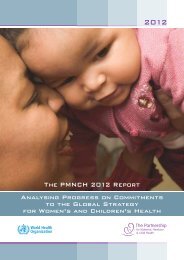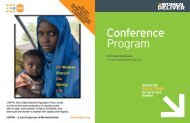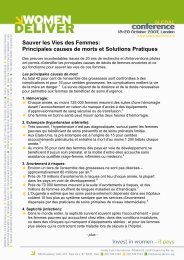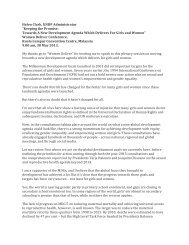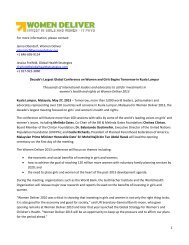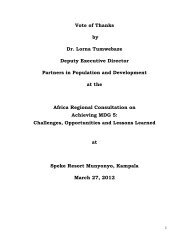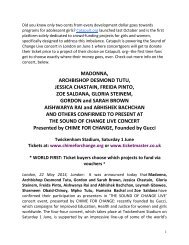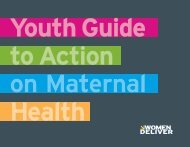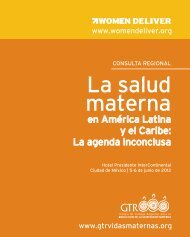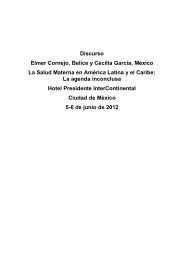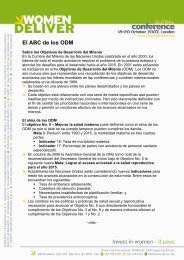State of World Population 2012 - UNFPA Haiti
State of World Population 2012 - UNFPA Haiti
State of World Population 2012 - UNFPA Haiti
Create successful ePaper yourself
Turn your PDF publications into a flip-book with our unique Google optimized e-Paper software.
When individuals are able to exercise the right to familyplanning, they are able to make decisions about the timingand spacing <strong>of</strong> their pregnancies and are also able toexercise—and benefit from—many other rightsThe governments that endorsed the ICPDProgramme <strong>of</strong> Action committed to ensuringthat individuals have the information, educationand means to freely and responsibly decidewhether and when to have children and agreedthat family planning is a right.The right to family planning is also explicitlystated in the Convention on the Elimination<strong>of</strong> All Forms <strong>of</strong>DiscriminationAgainst Women.And, familyplanning is includedin MillenniumDevelopment Goal5, especially target5-B, which aims foruniversal access toreproductive healthby 2015. But progresswithin our grasp.towards achievingthis goal lags behindprogress towards the other MillenniumDevelopment Goals.So what happens after 2015, after thedeadline for achieving the MillenniumDevelopment Goals has passed?The values and principles affirmed in theMillennium Declaration provide a solidfoundation for addressing global developmentchallenges. The post-2015 sustainabledevelopment agenda will likely be based onthe fundamental principles <strong>of</strong> human rights,equality and sustainability. In the context <strong>of</strong>these principles, development goals would bePlanning one’s family isa fundamental humanright, and something thatwomen and men <strong>of</strong> allages everywhere in theworld yearn to achieve. In<strong>2012</strong>, realizing this rightfor all seems increasinglypursued along four interdependent dimensions:inclusive social development, environmentalsustainability, inclusive economic developmentand peace and security.The vision for the post-2015 developmentagenda is holistic and global and rests on coreprinciples, values and standards that derive frominternationally agreed-upon frameworks. Theseprinciples will contribute to policy coherence atthe global, regional, national and sub-nationallevels, and ensure that development activitiesare mutually reinforcing.Family planning is one such activity. Whenindividuals are able to exercise the right t<strong>of</strong>amily planning, they areable to make decisions aboutthe timing and spacing <strong>of</strong>their pregnancies and arealso able to exercise—andbenefit from—many otherrights, such as rights toeducation, health anddevelopment.The ability to determineif and when to have childrenand how many to have reflectsthe realization <strong>of</strong> equal rightsand opportunities. Familyplanning is therefore a matter <strong>of</strong> equity andsocial justice.Four broad recommendations forrecognizing family planning as a matter <strong>of</strong>core rights and sustainable development—and specific strategies for achieving theserecommendations—are outlined here. Theypoint to the need to 1) take or reinforce arights-based approach; 2) secure an emphasis onfamily planning in the post-2015 sustainabledevelopment framework; 3) ensure equality byfocusing on specific excluded groups; 4) raise thefunds to invest fully in family planning.98 CHAPTER 6: MAKING THE RIGHT TO FAMILY PLANNING UNIVERSAL




